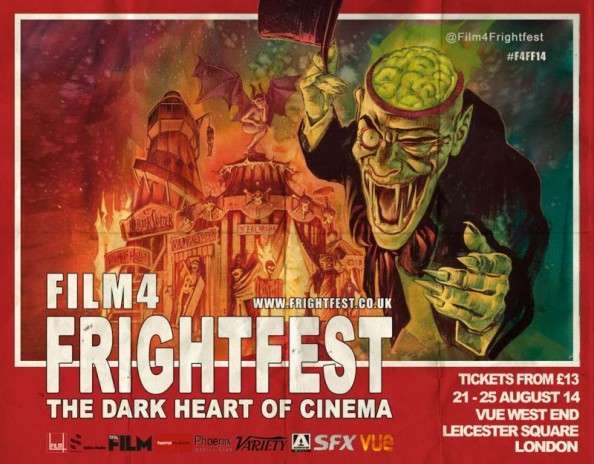
15th Film4 FrightFest
21-25 August 2014
London, UK
FrightFest website
The first edition of Film4 FrightFest in its new venue on Leicester Square, the Vue, was a resounding success, with an impressive line-up of films, terrific guests such as John McNaugton, Alan Moore and Jörg Buttgereit, and a lively sense of community. Stylistically and thematically, the programme was diverse, ranging from witty horror comedies to emotionally weighty thrillers and mind-boggling science fiction. After years of zombie domination, the monster of predilection this year was the werewolf, while children in peril and dangerous lovers also featured heavily and there was an underlying current of concern with the medium of film itself.
The festival opened with Adam Wingard’s wildly entertaining homage to 80s slasher/action flicks The Guest, about a mysterious soldier who ingratiates himself into the lives of a family after bringing them a message from their dead son with whom he served in Afghanistan. After a tense, enigmatic first part, the story shifted into black comedy, turning into a fun popcorn horror movie – which was very enjoyable, but it would be nice to see Wingard return to the more serious territory of A Horrible Way to Die at some point. Following the opposite trajectory, Faults started as a comedy about a washed-out cult expert who attempts to de-programme a young woman controlled by a mysterious cult, but turned into an increasingly strange and riveting face-off between the characters, in which roles become reversed. Also of note among the more comedic offerings, the hilarious and bloody Housebound from New Zealand was a blast, with clever twists and hugely satisfying characters, led by delinquent ball of rage Kylie and her well-meaning but clueless chatterbox mother.
The greatest find of the festival was undoubtedly Jennifer Kent’s wonderfully creepy and poignant monster story The Babadook. There were more children in peril in Henry: Portrait of a Serial Killer director John McNaughton’s return to the big screen, The Harvest, a chilling autumnal fairy tale of sorts.
Fabrice Du Welz’s intense take on The Honeymoon Killers story Alleluia was another heavyweight of the festival and the most accomplished of the unsettling psycho-sexual thrillers in the programme. Ate De Jong’s Deadly Virtues used bondage to explore the bonds of marriage in a story of home invasion with a twist. Despite its flaws, it was a captivating film with ideas and originality. Marriage was also under scrutiny in simmering two-hander Honeymoon. The dark rape-revenge thriller Julia investigated violent catharsis and female empowerment in interesting, if rather muddled ways – director Matthew A. Brown did not seem entirely sure of where he was taking his story. On a lighter note, Hitoshi Matsumoto took a delirious approach to S&M in R100, an insane Japanese comedy about a middle-aged widower who gets more than he bargained for when he joins an underground club whose dominatrixes include The Queen of Spit in an eye-popping musical sequence and The Queen of Gobbling…
With a greater diversity of complex characters, in particular female, than in previous years, the programme also interestingly reflected a strong male anxiety. Deadly Virtues made a point about the wife earning more money than her husband, an important element in the shifting dynamic of their marriage. In the same way, Ivan Kavanagh’s The Canal added a twist to its familiar jealous husband story in that the wife is the one with the high-powered job while his job, seen as lowly, is dismissed by other characters. With physical castration featuring in a number of films in the programme (Julia being the most notable), there seemed to be a simmering unease about the place of men in marriage and society, and a fear of sexual and social emasculation.
The Canal was one of a handful of films concerned with its own medium, probing the ghostly quality of film itself. In R100, the story of the widower is a film being made within the film – and shown to flabbergasted executives. The excellent occult-tinged Hollywood ambition tale Starry Eyes focused on a would-be actress who sells her soul to a satanic production company for stardom. VHS Viral continued the found footage franchise with a great segment by Nacho Vigalondo while Jessica Cameron’s Truth or Dare took on reality TV with the same subtlety as the shows it satirizes. Among the documentaries, David Gregory’s fascinating Lost Soul – The Doomed Journey of Richard Stanley’s Island of Dr. Moreau was one of the most talked about films of the festival.
It was great to see werewolves used to dig into a variety of themes, even if the results were not always fully convincing. The Samurai, by German director Till Kleinert, was an intriguing, although heavy-handed take on queerness in a small town. It had a very memorable character in the transvestite sword-wielding lone wolf maniac who leads the solitary young local policeman into a journey of bloody self-discovery. Another interesting angle came from Adrian Garcia Bogliano in Late Phases, which stars the brilliant Nick Damici as a cranky blind veteran who moves into a retirement community terrorised by a mysterious creature. With most of its characters above the age of 60, it was a fairly brave, original and entertaining film about ageing, and how to face death with dignity.
Science fiction had a strong presence in the programme this year with Nacho Vigalondo’s mind-puzzler Open Windows, The Signal which closed the festival in beautiful, if somewhat mystifying manner, and James Ward’s convoluted chiller Coherence presented by the Duke Mitchell Film Club. For the first time, the Duke Mitchell brought their inimitable film party to FrightFest, invading one of the cinemas on the Saturday night with their anarchic mix of outlandish clips, excellent guests and wild shenanigans, which was much enjoyed by the packed auditorium.
Virginie Sélavy
